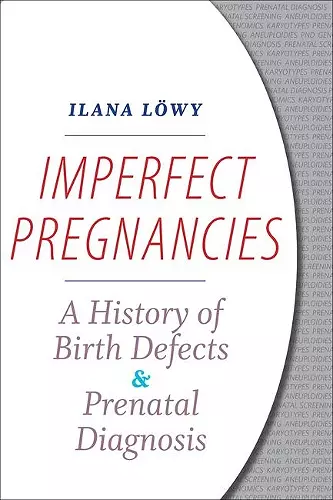Imperfect Pregnancies
A History of Birth Defects and Prenatal Diagnosis
Format:Hardback
Publisher:Johns Hopkins University Press
Published:7th Nov '17
Currently unavailable, and unfortunately no date known when it will be back

A wonderful, erudite, and eminently readable study of the history of prenatal testing and the emergence of birth defect classification. Clearly and beautifully written, Imperfect Pregnancies vividly illuminates the cultural, social, and experiential significance of expanding prenatal testing technology. -- Joanna Latimer, University of York, author of The Gene, the Clinic, and the Family: Diagnosing Dysmorphology, Reviving Medical Dominance
This book will interest students, scholars, health professionals, administrators, and activists interested in issues surrounding new medical technologies, screening, risk management, pregnancy, disability, and the history and social politics of women's bodies.In the 1960s, thanks to the development of prenatal diagnosis, medicine found a new object of study: the living fetus. At first, prenatal testing was proposed only to women at a high risk of giving birth to an impaired child. But in the following decades, such testing has become routine. In Imperfect Pregnancies, Ilana Lowy argues that the generalization of prenatal diagnosis has radically changed the experience of pregnancy for tens of millions of women worldwide. Although most women are reassured that their future child is developing well, others face a stressful period of waiting for results, uncertain prognosis, and difficult decisions. Lowy follows the rise of biomedical technologies that made prenatal diagnosis possible and investigates the institutional, sociocultural, economic, legal, and political consequences of their widespread diffusion. Because prenatal diagnosis is linked to the contentious issue of selective termination of pregnancy for a fetal anomaly, debates on this topic have largely centered on the rejection of human imperfection and the notion that we are now perched on a slippery slope that will lead to new eugenics. Imperfect Pregnancies tells a more complicated story, emphasizing that there is no single standardized way to scrutinize the fetus, but there are a great number of historically conditioned and situated approaches. This book will interest students, scholars, health professionals, administrators, and activists interested in issues surrounding new medical technologies, screening, risk management, pregnancy, disability, and the history and social politics of women's bodies.
If you are a supporter or a critic of prenatal testing, or, like many people, decidedly ambiguous, there is much that you will learn [from Imperfect Pregnancies] and much that will make you pause and re-examine your own views and knowledge base.
—DNA Exchange
Above all, it is a rational, erudite, thoughtful – and thought-provoking – account of a major change in the experience of pregnancy which has come about largely unnoticed.
—British Society for the History of Medicine
The author expertly navigates the reader through history and follows the rise of biomedical technologies that have made prenatal diagnosis possible... This book will benefit students, academics, health professionals and activists interested in issues surrounding new medical technologies, screening, risk management, pregnancy, disability, and the history and social politics of women's bodies.
—Elaine Williams, Innovation Lead & Freedom To Speak Up Guardian, Berkshire Healthcare NHS Foundation Trust, Nursing Times
This highly readable book is important for historians of twentieth century medicine, sociologists of reproduction and bioethicists reflecting on "the beginning of life"... In a field of study beset by vehement rhetoric and bigotry, Löwy's reserved and metered style is a blessing, perhaps a precondition for fruitful reflection... Ilana Löwy sets the stage for the bioethical discourse on prenatal diagnosis and choice as a tug of war with three poles—the autonomy of the person as a woman and a mother, the good of the child, and fundamental social values such as respect for human life, reliable medical science and services, justice and solidarity.
—Y. M. Barilan, Sackler School of Medicine, Tel Aviv University, Tel Aviv, Israel, Medicine, Health Care and Philosophy
Since its early stages, prenatal diagnosis has been balancing between the promises of safer pregnancies and healthier babies, and the dangers of its use for eugenic purposes. Ilana Löwy goes beyond this, and eloquently shows the limitations of such a dichotomised analysis . . . Löwy summons a wide range of disciplinary fields to solidly support this historical and comparative analysis of this field of research and medical practice, offering an unbiased yet critical approach.
—Mario J.D.S. Santos, Instituto Universitário de Lisboa, Sociology of Health and Illness
Löwy gives a very useful overview of the growth of prenatal diagnostic technologies and the expansion of prenatal diagnosis from a small group of women with at-risk pregnancies to ever wider circles.
—Marion Schmidt, Georg August Universität, H-Disability
An accomplished piece of scholarship, Imperfect Pregnancies will be necessary reading for students and historians of medicine and medical technology, particularly those interested in a comparative perspective. Lowy's book places current debates about disabilities, reproductive technologies, and abortion in an essential historical context. It encourages scholars to think more about the complicated implications of supposedly progressive medical and technological advances, provides a synthesis of the main developments in biomedical technology in the twentieth century, and paves the way for future specialized research.
—Cara Delay, Ph.D., College of Charleston, Journal of the History of Medicine & Allied Sciences
ISBN: 9781421423630
Dimensions: 229mm x 152mm x 24mm
Weight: 544g
296 pages